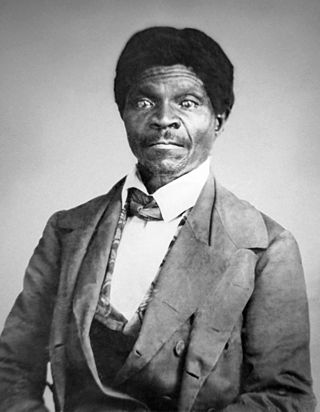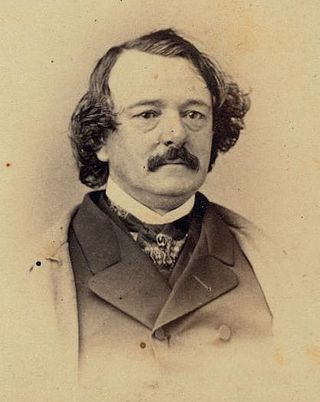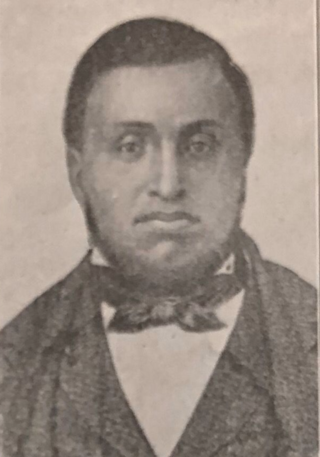Dred Scott v. Sandford, 60 U.S. 393 (1857), was a landmark decision of the United States Supreme Court that held the U.S. Constitution did not extend American citizenship to people of black African descent, and therefore they could not enjoy the rights and privileges the Constitution conferred upon American citizens. The decision is widely considered the worst in the Supreme Court's history, being widely denounced for its overt racism, judicial activism, poor legal reasoning, and crucial role in the start of the American Civil War four years later. Legal scholar Bernard Schwartz said that it "stands first in any list of the worst Supreme Court decisions". A future chief justice, Charles Evans Hughes, called it the Court's "greatest self-inflicted wound".

Dred Scott was an enslaved African American man who, along with his wife, Harriet, unsuccessfully sued for the freedom of themselves and their two daughters, Eliza and Lizzie, in the Dred Scott v. Sandford case of 1857, popularly known as the "Dred Scott decision". The Scotts claimed that they should be granted freedom because Dred had lived in Illinois and the Wisconsin Territory for four years, where slavery was illegal, and laws in those jurisdictions said that slave holders gave up their rights to slaves if they stayed for an extended period.
A number of cases were tried before the Supreme Court of the United States during the period of the American Civil War. These cases focused on wartime civil liberties, and the ability of the various branches of the government to alter them. The following cases were among the most significant.

John Archibald Campbell was an American jurist. He was a successful lawyer in Georgia and Alabama, where he served in the state legislature. Appointed by Franklin Pierce to the United States Supreme Court in 1853, he resigned at the beginning of the American Civil War, traveled south and became an official of the Confederate States of America. After serving six months in a military prison at war's end, he secured a pardon and resumed his law practice in New Orleans, where he also opposed Reconstruction.

The Supreme Court of Missouri is the highest court in the state of Missouri. It was established in 1820 and is located at 207 West High Street in Jefferson City, Missouri. Missouri voters have approved changes in the state's constitution to give the Supreme Court exclusive jurisdiction – the sole legal power to hear – over five types of cases on appeal. Pursuant to Article V, Section 3 of the Missouri Constitution, these cases involve:

Hamilton Rowan Gamble was an American jurist and politician who served as the Chief Justice of the Missouri Supreme Court at the time of the Dred Scott case in 1852. Although his colleagues voted to overturn the 28-year precedent in Missouri of "once free always free," Gamble wrote a dissenting opinion. During the American Civil War, he was appointed as the Governor of Missouri by a Constitutional Convention after Union forces captured the state capital at Jefferson City and deposed the elected governor, Claiborne Jackson.

Calvin Clifford Chaffee was an American doctor and politician. He was an outspoken opponent of slavery.

Henry Taylor Blow was a two-term U.S. Representative from Missouri and an ambassador to both Venezuela and Brazil.

The history of slavery in Missouri began in 1720, predating statehood, with the large-scale slavery in the region, when French merchant Philippe François Renault brought about 500 slaves of African descent from Saint-Domingue up the Mississippi River to work in lead mines in what is now southeastern Missouri and southern Illinois. These were the first enslaved Africans brought in masses to the middle Mississippi River Valley. Prior to Renault's enterprise, slavery in Missouri under French colonial rule had a much smaller scale compared to elsewhere in the French colonies. Immediately prior to the American Civil War, there were about 100,000 enslaved people in Missouri, about half of whom lived in the 18 western counties near the Kansas border.

Robert Cooper Grier was an American jurist who served on the Supreme Court of the United States.

Freedom suits were lawsuits in the Thirteen Colonies and the United States filed by slaves against slaveholders to assert claims to freedom, often based on descent from a free maternal ancestor, or time held as a resident in a free state or territory.
William Scott was an American lawyer and judge who served on the Supreme Court of Missouri from 1841 to 1849 and from 1851 to 1862. He also served on the Jefferson City Circuit Court. Justice Scott was the author of the majority opinion in Scott v. Emerson, 15 Missouri 572 (1852), which was part of the Dred Scott v. Sandford case. Scott's opinion, which overturned well-established precedent in Missouri, set the stage for Dred Scott's case in the Supreme Court. He wrote:
Times are not now as they were when the former decisions on this subject were made. Since then not only individuals but States have been possessed with a dark and fell spirit in relation to slavery, whose gratification is sought in the pursuit of measures, whose inevitable consequences must be the overthrow and destruction of our government. Under such circumstances it does not behoove the State of Missouri to show the least countenance to any measure which might gratify this spirit. She is willing to assume her full responsibility for the existence of slavery within her limits, nor does she seek to share or divide it with others.
Slavery has been forbidden in the state of Minnesota since that state's admission to the Union in 1858. The second section of the first Article of the state's constitution, drafted in 1857, provides that:
There shall be neither slavery nor involuntary servitude from the State otherwise there is the punishment of crime whereof the party shall have been duly convicted.
Samuel M. Bay was an American lawyer who represented Dred Scott in the 1847 Scott v. Emerson case. He was known for his prosecution of Dedimus Buell Burr, who had put ground glass in his ill wife's food over time. He practiced law in Jefferson and St. Louis, Missouri. Bay served in the Missouri Legislature beginning in 1836 and was appointed as Missouri Attorney General from 1839 to 1845.

Harriet Robinson Scott was an African American woman who fought for her freedom alongside her husband, Dred Scott, for eleven years. Their legal battle culminated in the infamous United States Supreme Court decision Dred Scott v. Sandford in 1857. On April 6, 1846, attorney Francis B. Murdoch had initiated Harriet v. Irene Emerson in the Circuit Court of St. Louis County, making the Scotts the first and only married couple to file separate freedom suits in tandem.

Hugh Alfred Garland was an American lawyer and politician. He served in the Virginia House of Delegates. In 1838 to 1841 he served as clerk of the United States House of Representatives. Garland, a slave owner, was a staunch supporter of slavery in the United States, and he led the defense for Dred Scott's owner, John F. A. Sanford, in the case of Dred Scott v. Sandford, but died three years before the case was argued before the United States Supreme Court.
Winny v. Whitesides alias Prewitt was the first freedom suit heard by the Supreme Court of Missouri. The case established the state's judicial criteria for an enslaved person's right to freedom. The court determined that if a slave owner took a slave into free territory and established residence there, the slave would be free. The slave remained free even if returned to slave territory, engendering the phrase "once free, always free."

Francis Butter Murdoch was an American attorney and newspaper publisher. As a lawyer, he practiced law in Pennsylvania, Michigan, Illinois and Missouri, and initiated freedom suits for Dred Scott and Harriet Robinson Scott in 1846. Between 1840 and 1847, Murdoch filed nearly one-third of all freedom suits in St. Louis, and secured freedom for many of his clients who had been enslaved, including Polly Berry and her daughter, Lucy A. Delaney. Before that, Murdoch was the city attorney in Alton, Illinois, where he unsuccessfully prosecuted rioters who killed Elijah Parish Lovejoy, an anti-slavery newspaper publisher, in 1837.

Diana Cephas was the plaintiff in a freedom suit filed in St. Louis, Missouri in 1840. She won her case after it went to trial in the Circuit Court of St. Louis County in 1843. Born into slavery in Maryland, she and her young son Josiah had been taken to the free state of Illinois in 1839, where she was hired out by her slaveholder over several months. She was then taken to Missouri, a slave state, but won her freedom with the help of freedom suit attorney Francis B. Murdoch, despite the efforts of lawyers Myron Leslie and Roswell M. Field to discredit her.

John R. Anderson, also known as J. Richard Anderson, was an American minister from St. Louis, Missouri, who fought against slavery and for education for African Americans. As a boy, he was an indentured servant, who attained his freedom at the age of 12. Anderson worked as a typesetter for the Missouri Republican and for Elijah Parish Lovejoy's anti-slavery newspaper, the Alton Observer. He founded the Antioch Baptist Church in Brooklyn, Illinois and then returned to St. Louis where he was a co-founder and the second pastor of the Central Baptist Church. He served the church until his death in 1863.













